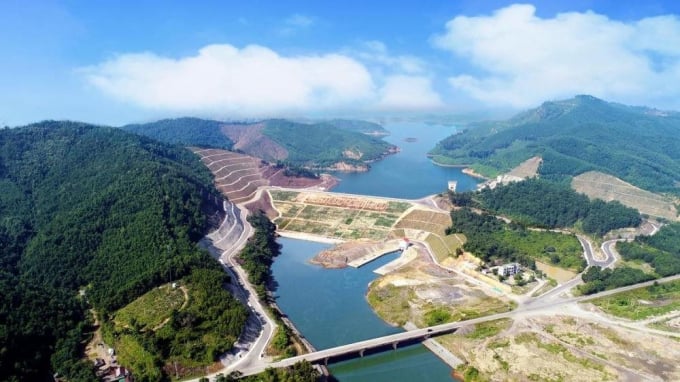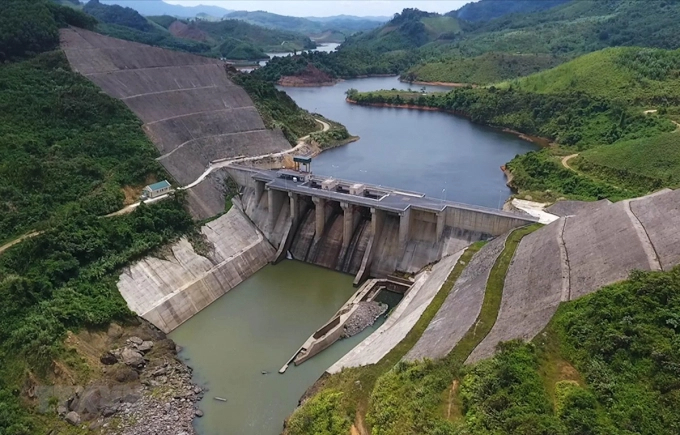December 31, 2025 | 07:37 GMT +7
December 31, 2025 | 07:37 GMT +7
Hotline: 0913.378.918
December 31, 2025 | 07:37 GMT +7
Hotline: 0913.378.918

Overview of Ngan Truoi dam area and reservoir in Ha Tinh province.
The new paper complements an article on irrigation project administration being devolved to provincial People's Committees based on management and exploitation efficiency in certain circumstances.
The unit is expected to accept responsibility for incidents affecting the safety of the work and the downstream area as a result of subjective causes attributable to the management and exploitation unit. Additionally, the unit operating the irrigation works is evaluated for failing to complete assigned tasks and allowing serious violations in the implementation of regulations governing licensing for activities within the unit to occur.
MARD explained the idea by stating that almost all interprovincial irrigation works are managed by local governments. The majority of municipalities manage and utilize these works effectively. There are still a lot of management and exploitation duties to be completed in a number of projects, and as a result, local exploitation units have not been implemented effectively, resulting in suboptimal work efficiency. There are even locations where the operation, security, and safety of the works are significantly impacted.
The present decentralization of interprovincial project management ensures that both the national and local governments maintain the status quo. However, rules for exceptional circumstances are essential to really enhance the capacity and efficiency of project management and exploitation.

Assign specific responsibilities of the ministry and localities in the management of irrigation works.
The ministry published three papers on decentralizing the administration of 23 works whose exploitation and protection are delegated by MARD to local governments. There are no laws defining the particular duties of ministries and local governments when decentralized activities are managed in this manner.
As a consequence, the ministry suggested amending an item of the Irrigation Law to include a section on irrigation works management decentralization.
To begin, MARD is responsible for compiling and organizing a list of medium-term funding sources for each period of repair, upgrade, and modernization of decentralized works. Organizing and supervising the monitoring and supervision of water sources and water quality in interprovincial projects for the purpose of direction and administration. Creating and maintaining a database on irrigation, the use, and preservation of which spans two or more provinces. Examining and approving adjustments to interprovincial dam and reservoir duties in consultation with the provinces' People's Committees. Additionally, advising and checking the irrigation law's application.
Unless otherwise specified by law, provincial People's Committees shall assume the owner's obligations for decentralized irrigation works. Directing the local irrigation work exploitation unit to manage and exploit irrigation works in compliance with the irrigation legislation and other applicable regulations.
According to the Directorate of Water Resources, Vietnam has constructed approximately 900 irrigation systems with a service area of 200 hectares or more, including 122 medium and large irrigation systems with a crop area of more than 2,000 hectares. Currently, the nation has 7,342 dams and irrigation reservoirs with a combined storage capacity of 50,000m3 or a dam height of at least 5m.
The irrigation system's total irrigation capacity is 4.28 million hectares, with annual water supply guaranteed for 7.3 million hectares of rice land and 1.72 million hectares of vegetables; over 6 billion m3 of domestic and industrial water; flood prevention and control, flood control for urban areas, residential areas, and production protection. Which prioritizes a number of large-scale irrigation projects.
Translated by Samuel Pham
/2025/12/29/0829-2-000508_274.jpg)
(VAN) Hai Phong is tightening management, with 100% of fishing vessels licensed and equipped with vessel monitoring systems, joining the national effort to lift the EC's 'yellow card.'
/2025/12/27/2744-1-121716_241.jpg)
(VAN) The Viet Nam Environment Protection Fund is the national environment protection fund and a state financial institution under the Ministry of Agriculture and Environment.
/2025/12/27/2015-2-111213_813.jpg)
(VAN) In efforts to realize the goal of Net Zero emissions, reducing urban emissions is regarded as a key solution.

(VAN) Deputy Prime Minister Tran Hong Ha requested to design the EPR mechanism toward a circular economy that is transparent, feasible, and non-administrative and aligned with actual recycling capacity.

(VAN) On December 24, Deputy Prime Minister Tran Hong Ha chaired a meeting about approving greenhouse gas emission quotas for 2025 - 2026 period.

(VAN) As Viet Nam enters a new era, the national agricultural sector must proactively adapt to global trends to transform current challenges into strategic development opportunities.
/2025/12/18/5046-3-154320_307.jpg)
(VAN) Granting planting area codes is a solution that helps Lao Cai manage forests effectively while also laying a data foundation to support the development of the carbon credit market in the future.